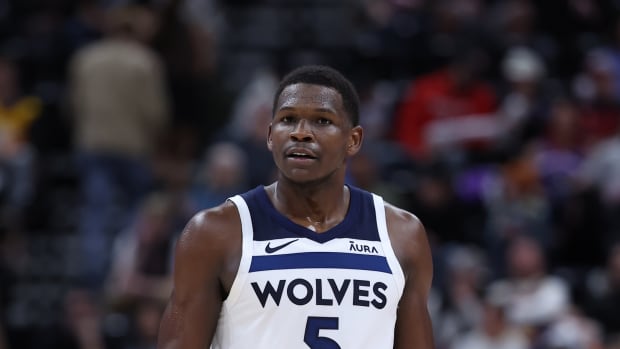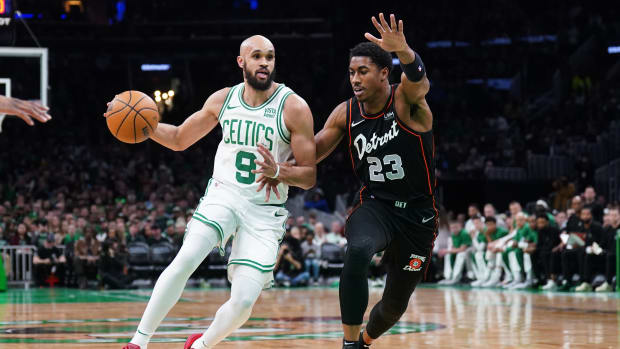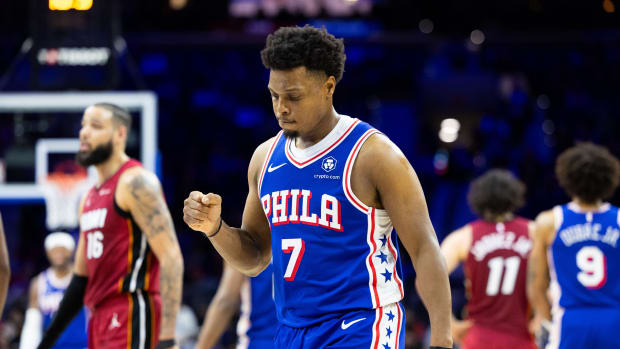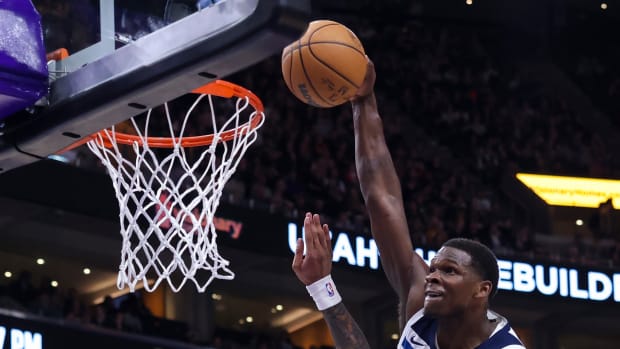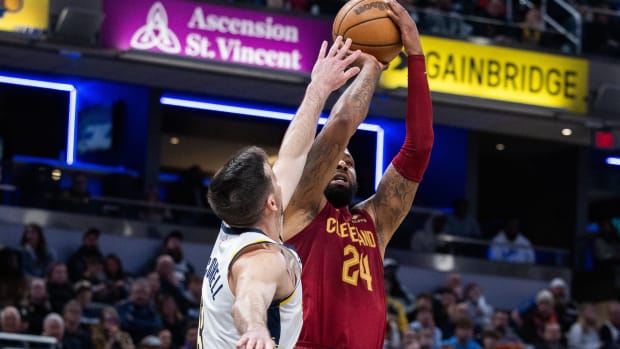
James Harden Called Daryl Morey a Liar And the NBA Should Look Into It
James Harden’s favorite plays have long been the step-back three and the drive that gets him to the free throw line, but now he has a third: the bomb thrown at management. Hey, as the great ones get older, they expand their game. Harden detonated his way out of Houston. Then he forced his way out of Brooklyn. Now he is trying to get out of Philadelphia, which is why he told an audience in China, in comments recorded on video:
“Daryl Morey is a liar, and I will never be a part of an organization that he’s a part of.”
Harden, who is famously reluctant to pick up his dribble, then said: “Let me say that again: Daryl Morey is a liar, and I will never be a part of an organization that he’s a part of."
Harden’s phone should be buzzing right now with a call from the league office, which needs to ask him a simple question:
Why?
Why is Morey a liar?

Harden is once again on the outs with the organization that employs him.
Eric Hartline/USA TODAY Sports
This is no longer just a spat between superstar and team. It is—or should be—an investigation into salary-cap violations.
Maybe Morey promised Harden he would trade him and then didn’t. Or promised to try to trade him and didn’t try all that hard. Those would be legal lies.
But maybe, as has been widely speculated, Morey promised Harden he would offer a lucrative contract extension and then failed to offer it. If that’s the case, Morey violated Article XIII, Section 2 of the league’s collective bargaining agreement, which is titled “No Unauthorized Agreements.” It forbids “any agreements or transactions of any kind … express or implied, oral or written … concerning any future Renegotiation, Extension, or other amendment of an existing Player Contract, or entry into a new Player Contract.” It also prohibits “assurances of intent.”
This is what we know: In the summer of 2022, Harden declined to pick up his $47.4 million player option for ’22–23. He ended up making $33 million instead. He also got a player option worth $35.6 million for the ’23–24 season, but that was an undeniable pay cut. He said publicly he did it to give the Sixers financial flexibility to improve their team.
Then, this summer, Harden picked up that $35.6 million option—and simultaneously requested a trade. It has been widely reported he was upset the Sixers did not offer him the kind of larger, longer extension he wants.
If Harden is upset only because he thinks he deserves that extension, then he is entitled to feel that way. But that wouldn’t make Morey a liar.
If Harden is upset because he declined that $47.4 million option in exchange for the promise of an extension, then the Sixers have a problem. That would be a blatant violation of the salary cap. The whole point of that “No Unauthorized Agreements” clause is to keep teams from making wink-wink agreements to push financial commitments into the future.
Maybe Morey did nothing wrong. But if the NBA doesn’t investigate, what is the point of having the rule?
In the NBA, as in the NFL, teams and agents have long flouted rules regarding contract offers. There is a reason so many deals are magically consummated as soon as the free-agency window opens. The league has struggled to enforce the rules, largely because so many people break them. Very few people want to snitch over a common practice.
But on occasion, the NBA has nailed violators. The league docked the Heat and Bulls second-round picks for tampering with prospective free agents Kyle Lowry and Lonzo Ball, respectively, in the summer of 2021. (The Heat acquired Lowry, and the Bulls acquired Ball in sign-and-trade deals that they reached implausibly fast.) The NBA has also fined various teams and executives for tampering.
The league fined Morey $50,000 for retweeting a tweet celebrating Harden when Morey was with the Sixers and Harden was a disgruntled Rocket. It also fined Morey $75,000 for a goofy reference to Steph Curry joining his brother Seth, who was a Sixer. The league also fined the Bucks $50,000 when general manager Jon Horst said the team would offer Giannis Antetokounmpo a max contract.
Nobody thought Morey would sign Steph Curry. Everybody knew the Bucks would offer Antetokounmpo a max deal. The NBA fined them, anyway, to show that the rules matter.
If the Sixers promised Harden an extension in exchange for reducing his 2022–23 salary, that would be a much bigger deal than any of these. The Heat and Bulls could have waited and gotten the Lowry and Ball deals done by the book. Harden’s pay cut allowed the 76ers to make moves they otherwise could not have made.
The NBA has to look into this—and violations are easier to prove than you might think. The collective bargaining agreement says the league could find teams guilty “by direct or circumstantial evidence, including, but not limited to, evidence that a Player Contract or any term or provision thereof cannot rationally be explained” otherwise.
If Harden took the pay cut just to help the team, why is he so angry a year later when he is still under contract? Why is he calling Morey a liar? What do their text messages from the past 14 months say?
Some NBA divorces are amicable. This one is nasty, and they haven’t even split yet. The 76ers already had a James Harden problem. Now they should have a league-office problem, too.































